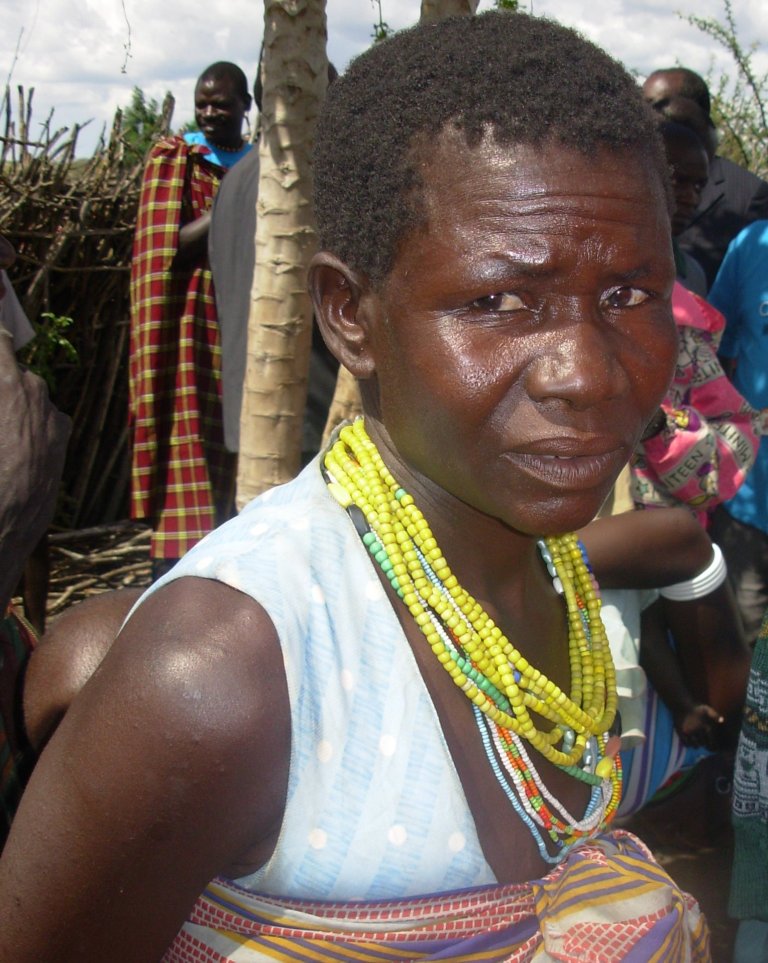Angelina Abura cradled her malnourished child in Nawaikorot, Moroto District of the Karamoja region, as she waited for his polio vaccination, thinking of her next meal.
"We have not harvested anything of late, our granaries are empty," she said on 1 October. "We survive by eating some leaves and when it rains, some green plants; but gathering them is a risk because you can lose your life in the process."
Alice Ngorok, who was also waiting, agreed. "Our main harvest of sunflower is no more, the sorghum plant which is our staple food has failed and we last received food relief on 7 July," she told IRIN.
"We now survive by eating shrubs," she added. "Our children have refused to go to school because they have not eaten."
Thousands of people in Karamoja are facing serious food shortages. Largely inhabited by agro-pastoralist communities, the remote region in north-eastern Uganda suffers endemic security problems.
Home to about 1.1 million people, the semi-arid region has the highest maternal and infant mortality rates in Uganda and the lowest life expectancy. It is also awash with weapons.
In a 31 August update, the Famine Early Warning System Network (FEWS Net) warned that the number of food-insecure people in Karamoja had risen.
"Food security in Karamoja (Abim, Kaabong, Kotido, Moroto and Nakapiripirit Districts) continues to deteriorate, and will require assistance until the next harvest in 2009, as a result of failed rains, depleted food stocks, low incomes, high prices, poor livestock terms of trade, and widespread livestock disease," it noted.
"The number of people highly food-insecure has increased 7 percent between July and August 2008 alone, to 750,000 people."
Separately, the International Federation of the Red Cross (IFRC) said the region lacked food stocks to take its population through to the next harvest season and malnutrition rates among children were relatively high.
The situation is particularly bad in Abim and Kotido, where nearly 80 percent of the population is highly food-insecure due to three consecutive seasons of poor harvests, depleted food stocks, low livestock production and poor livestock and/or cereal terms of trade related to high cereal prices.
"Many parts of Karamoja have been described as chronically food-insecure for the past five years due to a combination of factors, including recurrent drought, over-population and declining resource base for agro-pastoralism," the IFRC noted in a 23 September report.
"As the rainy season is approaching and the seed requirements, especially in the two districts of Abim and Kotido, are not covered, it is [expected] that the problem of food insecurity will escalate dramatically after the rainy season due to lack of food production," it added.
Coping mechanisms
To supplement her livelihood, Ngorok gathers firewood to sell. But she risks being ambushed.
"People are at a risk of being killed when they go to the forest to gather firewood and fruits," she told IRIN. "They waylay us and take whatever food we have gathered."
Jacob Lokeris said some of the weapons are used to loot food aid. "After food is distributed [by relief agencies], they attack and loot all of it and leave us with nothing to feed on," he explained. "If you resist, you are killed."
The other problem, however, is rising food prices. Between the third quarter of 2007 and August 2008, cereal prices have increased by 20-65 percent, say local residents, while beans cost 60 percent more than normal.
"There is an acute shortage of food everywhere," Julius Ochieng, chairman of the neighbouring Amuria District, said.
 Photo: Vincent Mayanja/IRIN  |
| Men share a calabash of blood gotten from a slaughtered bull. There is acute food shortage in Karamoja |
Successive shocks
Last week, Ugandan officials said at least 346 Karamojong women and children had crossed into neighbouring Pader District in search of food, and had settled in the sub-counties of Adilang, Lapono, Paimol and Parabongo, adjacent to Abim and Kotido.
The region, according to agencies, has been severely affected by three years of successive shocks. These include severe drought in 2006 and a combination of dry spells, flooding, animal disease and crop fungus.
In July, Musa Ecweru, state minister in charge of refugees and disaster preparedness, told IRIN that prolonged dry conditions after flooding last year had led to a 90 percent crop failure. Plants had failed to germinate in the heat.
"Karamoja is facing an acute nutrition crisis that requires a scaled-up emergency nutrition and food security response in addition to interventions to improve coping mechanisms and prevent maladaptive coping such as out-migration," the government and UN Children’s Fund (UNICEF) said in a joint statement.
But all these efforts, Abura said, would need to coincide with ending the insecurity.
vm/eo/mw
This article was produced by IRIN News while it was part of the United Nations Office for the Coordination of Humanitarian Affairs. Please send queries on copyright or liability to the UN. For more information: https://shop.un.org/rights-permissions





